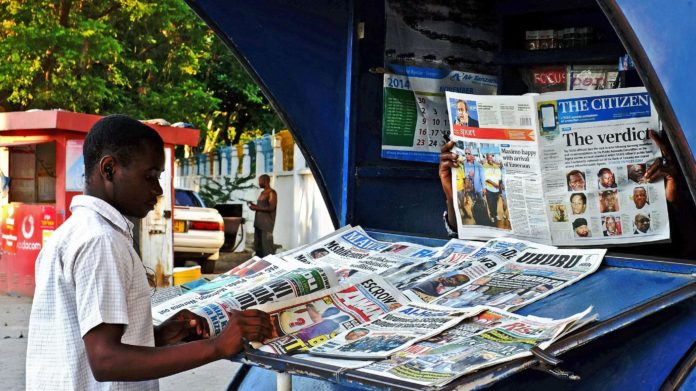Dar es Salaam, June 25 — The United States has expressed concern over recent actions by the government of Tanzania to revoke media license of an opposition party newspaper it accuses of publishing false information flouting the country’s laws and violating journalism ethics.
Tanzania Daima—a popular Swahili tabloid known for its razor-sharp scathing reports was effectively banned on 24th June by the government’s director of Information, who doubles as Registrar of Newspapers for allegedly, repeatedly flouting national laws in its reportage.
A statement issued by the Embassy of the United States in Dar es Salaam Thursday said the newspaper ban is part of actions to stifle democratic norms in the East African country, which follows a worrying pattern of intimidation of the opposition members, civil society, and media outlets.
“The right to…freedom of expression are enshrined in the Tanzanian constitution, and the Universal Declaration of Human Rights. The U.S Embassy proudly supports freedom of expression and inclusive political participation in all formats,” the embassy said in a statement.
Since 2015, Tanzania has seen a sharp decline in respect for basic freedoms of expression and association, undermining both media freedom and civil society, campaigners said.
The government has enacted tougher laws that repress independent reporting and restrict the works of the media and non-governmental organizations.
Campaigners are increasingly concerned with the on-going crackdown on freedom of expression in Tanzania, urging the government to uphold those rights which are deeply embedded in the constitution.
Human Rights Watch—a global charity working to defend rights and secure justice worldwide described Tanzania’s newspaper ban as a gesture of intolerance to free expression
Since the enactment of the Media Services Act in 2016, several newspapers in Tanzania, including Mwananchi, The Citizen, Mawio, Mseto, Tanzania Daima, and Nipashe, have been subjected to various punishments including fines, ban and cancellation of publishing licenses.
The government claimed that Tanzania Daima newspaper was repeatedly warned to refrain from publishing inflammatory reports but it ignored the warnings.
Martin Malera, the newspaper editor said they had been questioned by the government when they published a story in which a cleric called upon the opposition to demand a free electoral commission.
In two separate reports issued last year, Human Rights Watch and Amnesty International said repression of the Media, human rights defenders and opposition politicians in Tanzania intensified in 2015.
Both reports found that the government has adopted harsher laws that stifle independent journalism and severely curbing the activities of non-governmental organizations.
Since then newspapers and radio stations have been banned or suspended for contents deemed critical, Human Rights Watch said.
Authorities have repeatedly used the 2015 Cyber Crime Act to prosecute journalists and activists for social media posts, the charity said.
Meanwhile the Media Council of Tanzania—has expressed shock over the newspaper ban, saying it will further curtail media freedom in the coming general elections.
“This decision puts the country in a bad light and casts doubt on level playing field, especially because…the paper was known to stand for alternative views,” said Kajubi Mukajanga, the Secretary-General of the Media Council of Tanzania.
According to him, the Media Services Act of 2016, is a bad law since it gives the government-appointed registrar the whim to complain, prosecute, and deliver a verdict on its own cases.
“The law provides an aggrieved party whose license has been revoked to re-apply for the license to the same authority that revoked it,” Mukajanga said in a statement.
Mukajanga said revoking the newspaper’s license, would deny the workers income thus affecting their livelihoods.

